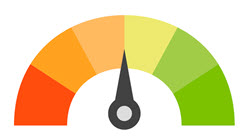Applying for Credit
Chances are, you’ll need to apply for credit at some point in your life. Whether you are buying a car, buying a home, or opening a credit card, lenders will be taking a close look at your credit history. You should understand what they’re looking for when you’re applying for credit.
the five c’s of credit
How do lenders decide whether to loan you money? Many look at five factors.
When lenders evaluate character, they look at stability. For example, how long you’ve lived at your current address or how long you’ve been in your current job. They also look at whether you have a good record of paying your bills on time and in full. If you want a loan for your business, the lender may consider your experience and track record in your business and industry to evaluate how trustworthy you are to repay.
Capacity refers to considering your other debts and expenses when determining your ability to repay the loan. Creditors evaluate your debt-to-income ratio, which is how much you owe compared to how much you earn. The lower your ratio, the more confident creditors will be in your capacity to repay the money you borrow.
Capital refers to your net worth. This is the value of your assets minus your liabilities. In simple terms, what you own (for example, car, real estate, cash, and investments) minus how much you owe.
Collateral refers to an asset of a borrower (for example, a home) that a lender has a right to take ownership of and use to pay the debt if the borrower is unable to make the loan payments as agreed.
Some lenders may require a guarantee in addition to collateral when you’re applying for credit. A guarantee means that another person signs a document promising to repay the loan if you can’t.
Lenders consider a number of outside circumstances that may affect the borrower’s financial situation and ability to repay, for example, what’s happening in the local economy. If the borrower is a business, the lender may evaluate the financial health of the borrower’s industry, their local market, and competition.
Some lenders develop their own loan decision “scorecards” using aspects of the 5 C’s and other factors. Example: borrower’s credit used vs. credit available.
If the bank says no to your loan
It can take a few days for a decision about your loan application. However, a bank legally has up to 30 days to respond. If a lender turns you down, do not take it personally.
Here are few possible reasons a loan may not be granted:
- Irregular employment.
- Not enough income to repay the loan.
- Poor credit history (slow repayment of other loans).
- Lack of credit history.
- Too short a time at residence.
- Insufficient down payment.

Here are steps you can take to have the bank reconsider your loan request:
- Find out if all sources of income were considered in evaluating your application.
- Pay off some of your existing debt.
- Find a reliable co-signer who is acceptable to the bank.
- Offer to make a larger down payment if possible.
- Establish credit by applying for a credit card with a low credit limit.
- If you have no credit history, find out if alternative payment history could be considered, for example, rent, or utility bills.
- Contact the credit bureau used by the bank to find out if there are any errors in the information they provided the bank.
Dealing with past credit problems
If you have late payments on your credit report because of illness or temporary unemployment, provide a written explanation to the lender explaining why your credit was poor for a period of time. A lender may not expect you to have a spotless credit history, but most expect you to have taken care of your credit problems before applying for credit.
If you currently have credit payments that are past due, pay them now in order to improve your credit. Once they are paid, work on developing a record of making payments on time for at least a year to improve your credit rating.
Learn more from the FTC
For further information about disputing errors and improving your credit report, visit the Federal Trade Commission (FTC).
